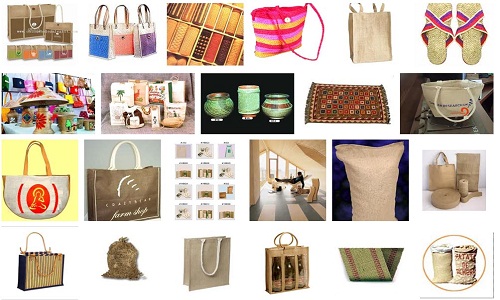"The textiles minister Smriti Zubin Irani unveiled ‘Jute-Smart’ an online portal to facilitate purchase of jute bags from the industry by state procurement agencies, on ‘Good Governance Day’. The launch also included Dashboard for Integrated Skill Development Scheme hosted on the NIC Cloud with access to public; and Bunkar Mitra – a Helpline for handholding of handloom weavers."

The textiles minister Smriti Zubin Irani unveiled ‘Jute-Smart’ an online portal to facilitate purchase of jute bags from the industry by state procurement agencies, on ‘Good Governance Day’. The launch also included Dashboard for Integrated Skill Development Scheme hosted on the NIC Cloud with access to public; and Bunkar Mitra – a Helpline for handholding of handloom weavers.
Jute-Smart’ aims to provide an integrated platform for stakeholders for easy access to information, transparency and ease of doing business. B-Twill Supply Management & Requisition Tool, in short, Jute-Smart’ is a web-based application that facilitates end to end transactions relating to procurement of B-Twill sacking. It is designed to integrate the process of indenting of B-Twill by SPAs; remit the required fund by )State Procurement Agencies) SPAs into their respective bank accounts; allocate Production Control cum Supply Order (PCSO) by the Jute Commissioner, etc.
Policy Change

The Cabinet Committee on Economic Affairs (CCEA) decided to transfer operation of purchase and supply of B-Twill sacking by the SPAs from the Directorate General of Supplies & Disposal (DGS&D) to the Office of Jute Commissioner, Kolkata with effect from November 1, 2016. Annually about Rs 5,500 crores worth of jute sacking is procured through support by the government to support the Indian jute workers and farmers.
Previous system relied mostly on paper and there were bottlenecks to information sharing between the stakeholders, mainly SPAs, the Ministry of Food and Public Distribution, Jute Mills, Inspecting Agency, Loaders, Consignees, Pay and Accounts Office etc. Since B-Twill sacking is an essential requirement for procurement of foodgrains, the entire operation is time-bound and needs to be closely monitored. In addition, the system provides for automated transactions through banks to reduce cost to the State Procurement Agencies on account of loss of interest in their funds. Necessary training has been provided to the State Procurement Agencies, Banks, Inspection Agencies and supplying jute millers for using this system.
ISDS Initiative
Integrated Skill Development Scheme (ISDS), the flagship demand driven placement linked skilling program of the Ministry is an initiative towards this direction. The Ministry is partnering state government agencies, industry, major textile training institutions, Textile Research Organizations and industry associations for implementing the scheme. Out of the 12th Plan target of 15 lakh persons under the scheme, the Ministry has so far trained a total of 8.82 lakh persons.
Bunkar Mitra — Handloom Helpline Centre
Currently 28 Weavers’ Service Centres (WSCs) are functioning across the country to provide technical assistance to handloom weavers in improving their skills. For seeking assistance, weavers have to personally visit the WSCs. As on date, there is no single point of contact where weavers can seek solutions for their technical issues/problems.
In order to enable poor weavers to overcome these problems, the Central Government has decided to establish a ‘Bunkar Mitra-Handloom Helpline Centre’ where professional queries of weavers will be answered by the experts in the field. This helpline will function from 10.00 am to 6 pm and initially it will be provided in 6 languages viz., Hindi, English and 4 other regional languages (Telugu, Tamil, Bengali & Assamese).












